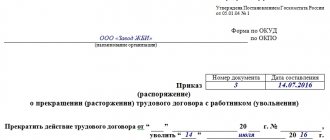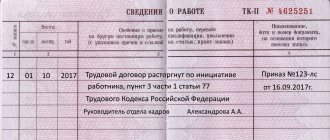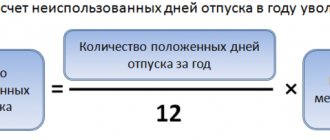What groups of grounds for dismissal are identified by Article 81 of the Labor Code of the Russian Federation?
The reasons for dismissals given in Article 81 of the Labor Code of the Russian Federation can be divided into the following groups:
- Occurring due to changes in the organizational structure of the employer - these are paragraphs. 1 (liquidation of employer), 2 (reduction of staff), 4 (change of owner).
- Related to the presence of the employee’s fault – these are paragraphs. 5–6 (not a single or one-time gross violation of labor discipline), 7–7.1 (loss of trust), 8 (immoral act), 9–10 (guilt of the manager), 11 (concealment or distortion of information about oneself).
- Others – this is paragraphs. 3 (inconsistency with the position held), 13 (additional grounds for the manager), 14 (other cases of dismissal).
You can also highlight among them those that will correlate:
- With all employees – this is paragraphs. 1–3, 5–6, 11.
- With employees of certain positions (occupations) – paragraphs. 7 (materially responsible persons), 7.1 (persons who may have a personal interest in the results of their decisions), 8 (teachers), 14 (persons defined in the relevant legislative acts).
- Only with managers - this is paragraphs. 4, 9 (making an unjustified decision), 10 (gross misconduct), 13 (additional evidence).
For any case of dismissal under Article 81 of the Labor Code of the Russian Federation, it is necessary to have a documentary justification for its application and to comply with certain procedures prior to the termination of the employment agreement. It is prohibited to dismiss an employee who is absent for good reasons (vacation of any kind, sick leave).
The inadequacy of the position and the guilt of the employee must always be proven and first considered taking into account mitigating circumstances. If the staff is reduced and the position is recognized as unsuitable, the employer must try to employ him before dismissing the employee.
Is it possible to fire an employee who has a disabled minor child?
Employees with disabled minor children are protected by law from dismissal if they are the sole guardian of the child. According to Article 261 of the Labor Code, the dismissal of such an employee at the initiative of the employer can only be carried out under paragraphs 1, 5, 6, 7, 8, 10, 11 of Article 81 of the Labor Code. This means that the manager cannot fire an employee for inadequacy for the position held. Since he is obliged to offer another position in the enterprise in return. The same norms apply to single mothers who are raising a child under three years old or who have several minor children.
What distinguishes the dismissal processes during liquidation and reduction (clauses 1 and 2 of Article 81 of the Labor Code of the Russian Federation)?
A complete picture of the procedure for dismissal due to the liquidation of an employer or in connection with a reduction in its staff, reflecting the whole variety of possible situations, emerges only as a result of an analysis of several articles of the Labor Code of the Russian Federation. Since there is no fault of the employee in the upcoming dismissal, conditions must be created that maximally mitigate its consequences for the employee. The employer incurs significant material costs.
The fact that the employee will be dismissed due to liquidation or reduction, he is notified in writing and in advance, no less than:
- 2 months in advance if the employee is an ordinary full-time employee (Article 180 of the Labor Code of the Russian Federation);
- 1 week if the employee was hired for a season (Article 296 of the Labor Code of the Russian Federation).
An employee facing redundancy is offered in writing the vacant positions available to the employer and is fired only if he refuses them.
Dismissal for both of these reasons is accompanied by the payment of severance pay, the purpose of which is to pay the dismissed employee for the time that, according to the law, is considered sufficient to find a new job:
- up to 3 months for an employee who is an ordinary full-time employee (Article 178 of the Labor Code of the Russian Federation);
- 2 weeks for an employee hired for a season (Article 296 of the Labor Code of the Russian Federation);
- Up to 6 months for an employee who worked in the Far North (Article 318 of the Labor Code of the Russian Federation).
If a full-time employee agrees to resign before the end of the 2-month warning period about the upcoming dismissal, then he will have the right to receive not only mandatory severance pay (Article 178 of the Labor Code of the Russian Federation), but also additional (Article 180 of the Labor Code of the Russian Federation). The amount of the additional benefit will be determined from the same average cost per day as the mandatory benefit, but other working days will be paid: those that make up the gap between the date of actual dismissal and the date of completion of the 2-month warning period about the upcoming dismissal. It will be paid on the day of dismissal.
For more information on calculating benefits payable upon liquidation, read the article “Calculating severance pay upon liquidation of an organization .
Also, upon dismissal, a mandatory benefit is paid, which to an employee hired for a season will be paid in full (for 2 weeks allocated for job search), and to a former full-time employee - only for 1 upcoming full month. Further receipt of severance pay by a former full-time employee will occur as follows:
- For the 2nd month (full if the employee was not employed there, or incomplete if employment occurred this month), benefits can be received upon its expiration upon presentation of evidence of lack of employment (work book) to the former employer. In the same way, benefits for the 3rd month are paid to an employee who worked in the Far North.
- For subsequent months (the 3rd for a former regular full-time employee and the 4th–6th for an employee who worked in the Far North), benefits are paid in the same manner, but with the obligatory presentation of a certificate from the employment service confirming that the person immediately after dismissal ( no later than 2 weeks for a former regular full-time employee and 1 month for an employee who worked in the Far North) registered with it.
Dismissal due to fake sick leave
Answering this question, we can say more: fake sick leave entails not only dismissal, but also liability under a criminal article. The sick leave form is an official document on the basis of which benefits are paid. It also serves as a justification for the person’s absence from the workplace. It is illegal to receive benefits using a false document and present it as proof of your absence from work. There are many ways to distinguish a fake hospital form from a genuine one: a genuine document has a lot of distinctive features. These are watermarks, a barcode, the color of the paper and the fibers from which it is composed, the color of the ink with which the sheet is filled, etc. Providing a false sick leave immediately entails three different types of liability: disciplinary, financial and criminal. Article 81 of the Labor Code will be applicable as disciplinary liability in case of dismissal for absenteeism. Failure to show up for work without justification is considered absenteeism and may result in dismissal if the employer is able to strictly observe the procedure and deadlines for applying penalties. A false sick leave certificate cannot be evidence of a valid reason for absence. This means that even if the truant provides this fake document on time, management has the right to apply the strictest penalties, based on Article 21 of the Labor Code upon dismissal. As a financial liability for an employee who has presented a false document, the requirement to return the amount of disability benefits, if he managed to receive it, is considered. If you refuse to return the money, the amount may be withheld from the salary, but in the amount of no more than 20% of each payment. The remainder of the debt is collected through the court. Plus, the employer may demand compensation for losses - for example, examination costs. As a criminal liability when using a deliberately forged document, the norm of Part 3 of Article 327 of the Criminal Code of the Russian Federation is applicable. The degree of punishment varies: the violator may be sentenced to a fine, compulsory or correctional labor, or to arrest for up to 6 months. In order to bring the culprit to justice, the management of the organization or the FSS of the Russian Federation (if they discovered the fake) contact the Department of Internal Affairs. Depending on the circumstances of the document falsification and the presence of a criminal purpose, other provisions of the Criminal Code of the Russian Federation may be applied. So, if the sick leave form was falsified independently, then Part 1 of Article 327 of the Criminal Code of the Russian Federation is subject to application, the punishment for which is more severe - you can be imprisoned for up to 2 years. If an employee expected to receive monetary payments through fraud, then Article 159.2 of the Criminal Code of the Russian Federation will apply, the fine for which is heavier and also provides for a restriction of freedom of up to 2 years. Thus, an employee’s attempt to use a fake sick leave certificate can lead to a lot of negative consequences for him. The minimum that can result for such a forgery is disciplinary action. Maximum - imprisonment for 2 years.
Who fires the only employee?
It can be quite realistic that a participant (founder) of a liquidated legal entity is at the same time its director and remains the only employee. The procedure for his actions in organizing his own dismissal should be as follows:
- As a participant (founder), he decides to liquidate the legal entity, appointing himself as the liquidator, to whom all functions for managing the legal entity are transferred.
- He, as a participant (founder), decides to resign as a manager in connection with the liquidation of the legal entity and the appointment of a liquidator.
- As the head of a legal entity, based on the decision of the participant (founder), he issues an order to resign as a manager due to liquidation. On this basis (clause 1 of Article 81 of the Labor Code of the Russian Federation), he dismisses himself, making an appropriate entry in the work book, which he has every right to do (clause 45 of the rules for maintaining work books, approved by Decree of the Government of the Russian Federation of April 16, 2003 No. 225).
- As a participant (founder), no later than 3 calendar days from the date of the decision on liquidation, he informs the registering Federal Tax Service about this in a special notification. The appointment of a liquidator is also reported there using a special form.
- As a liquidator, he publishes information about liquidation in the press, then conducts an inventory, the data of which will form the basis of the interim liquidation balance sheet.
- As a liquidator, before the date of exclusion of a legal entity from the Unified State Register of Legal Entities, it performs all necessary actions to terminate its existence, including submitting reports to the Federal Tax Service and paying taxes.
Read more about the composition and procedure for drawing up a balance sheet in the material “Balance Sheet (Assets and Liabilities, Sections, Types)” .
In what cases is it legal to lay off workers?
To dismiss an employee due to a reduction, the employer must fulfill a number of conditions:
- he must prove the actual reduction in staff;
- exercise the preemptive right to maintain a job, in accordance with Article 179 of the Labor Code of the Russian Federation;
- offer the employee another available job that corresponds to his specialty and state of health;
- notify the employee no earlier than two months before dismissal; the corresponding warning must be signed by the employee;
- make a preliminary request to the trade union to obtain an opinion on the decision to dismiss an employee who is a member or leader of the trade union.
If at least one of these conditions has not been met, then the employee has the right to apply for reinstatement. Upon termination of the employment contract, the employer is obliged to make a corresponding entry in the work book and personal card, on the basis of which severance pay will be paid and the average monthly salary will be saved for two months for the period of employment.
How to fire an employee who is not appropriate for the position (clause 3 of Article 81 of the Labor Code of the Russian Federation)?
An employee may not be able to cope with the work assigned to him for several reasons, for example:
- His qualifications were overestimated by the employer upon appointment to the position.
- The working conditions in which the employee is placed do not allow him to perform work at the proper level.
In both cases, the employee is not at fault. But if in the second case his unsatisfactory work cannot be considered a non-conformity, then the first one falls under this definition.
An employee can be recognized as unsuitable for a position if he/she simultaneously has:
- Documented evidence of unsatisfactory performance.
- Conclusions of the certification commission created in accordance with the requirements of the law, to which the employee is invited to carry out his certification. The procedure for conducting certification and the criteria by which qualifications are assessed must comply with those approved by internal regulations.
- Participation in the certification commission of a representative of the trade union body (if one exists), of which the employee is a member (Article 82 of the Labor Code of the Russian Federation).
If recognition has taken place, the employee must be offered in writing a vacant position corresponding to his qualifications or a lower one. If the employer does not have one or the employee refuses it, then he can be fired.
This basis cannot be applied to:
- a young specialist, since he obviously does not have the necessary qualifications;
- to a minor without the consent of the labor inspectorate and the commission for minors (Article 269 of the Labor Code of the Russian Federation);
- pregnant woman (Article 261 of the Labor Code of the Russian Federation);
- a single mother with a child under 14 years of age or a disabled child under 18 years of age (Article 261 of the Labor Code of the Russian Federation);
- a person on vacation or sick leave (Article 81 of the Labor Code of the Russian Federation).
When for some reason the application of this basis turns out to be unacceptable, you can use the dismissal procedure for systematic disciplinary offenses under clause 5 of Art. 81 of the Labor Code of the Russian Federation, consistently applying all types of existing disciplinary sanctions to the employee.
For more information about the existing types of disciplinary penalties, read the article “Types of disciplinary sanctions under the Labor Code of the Russian Federation” .
When is dismissal due to inadequacy of the position held legal?
If, as a result of the certification, it is revealed that the employee does not meet the requirements of the position held, the employment contract may be terminated. According to the letter of Rostrud dated 03/06/2013 N PG/118061, such a decision can only be made on the basis of the conclusion of the certification commission. However, before dismissal, the employer is obliged to draw up a written offer for the employee with a list of existing similar vacancies at the enterprise. The employee must confirm by signature that he has read this document. If a suitable vacancy for the employee is not found, the employer issues a dismissal order.
What violations of discipline are considered gross and allow immediate dismissal?
Dismissal of an employee if he commits a single gross disciplinary offense related to work is possible immediately, bypassing educational measures (reprimand and reprimand). Such offenses are (Article 192 of the Labor Code of the Russian Federation):
- Absenteeism, which is equivalent to absence from the place considered working for the employee, for more than 4 hours in a row, as well as during the entire working day or entire shift (subclause a, clause 6, article 81 of the Labor Code of the Russian Federation).
- Appearing at work under the influence of any type of intoxicating substance (subparagraph b, paragraph 6, article 81 of the Labor Code of the Russian Federation).
- Disclosure of any (personal, state, commercial, official) secrets (subclause 6 of Article 81 of the Labor Code of the Russian Federation).
- Causing intentional harm (theft, embezzlement, destruction, damage) to someone else's property (subclause g, clause 6, article 81 of the Labor Code of the Russian Federation).
- Actions that resulted in the infliction of severe consequences on people (accident) and property (accident) or the creation of a high probability of such consequences (subparagraph 6 of Article 81 of the Labor Code of the Russian Federation).
- Actions that entail loss of trust: in terms of the values being served (clause 7 of Article 81 of the Labor Code of the Russian Federation) or in relation to concealment (distortion) of information about one’s income and property (clause 7.1 of Article 81 of the Labor Code of the Russian Federation).
- An act of an immoral nature committed by a teacher (clause 8 of Article 81 of the Labor Code of the Russian Federation).
- The adoption by the head of a legal entity, his deputy or the chief accountant of an unfounded decision, the consequence of which was significant material damage to the organization (clause 9 of Article 81 of the Labor Code of the Russian Federation).
- Gross violation by the head of a legal entity or his deputy of his direct labor duties (Clause 10, Article 81 of the Labor Code of the Russian Federation).
- Commitment by a teacher of a gross violation of the charter of an educational institution for the 2nd time within a year (clause 1 of Article 336 of the Labor Code of the Russian Federation).
- Disqualification of an athlete or violation of anti-doping rules (Article 348.11 of the Labor Code of the Russian Federation).
Additional payments to an employee dismissed due to staff reduction
Former employee has additional types of payments:
- Compensation for unused vacation, clauses 1–12 of Art. 127 Labor Code.
- A former employee who falls ill has the right to receive sick pay for the first 30 days. It is enough to bring the document to the enterprise. It can remain on the ballot for up to 4 months, until disability is registered in paragraph 2 of Art. 7 Civil Code of the Russian Federation. The amount of payments will be 60% of the average salary.
- A woman in labor can receive a one-time benefit upon presentation of a sick leave certificate.
- If the enterprise is cancelled, you should contact the FSS (Social Insurance Fund) for payment for temporary disability.
What options are there for dismissing the head of a legal entity?
The dismissal of the head of a legal entity at the initiative of the employer is provided for in several paragraphs of Art. 81 Labor Code of the Russian Federation:
- When there is a change of owner (clause 4, which also applies to deputies and the chief accountant). Such dismissal does not imply the guilt of these persons, is not mandatory, can be selective and is carried out within the first 3 months after the replacement of the owner (Article 75 of the Labor Code of the Russian Federation). Moreover, it is associated precisely with the transfer of ownership of the property of the entire legal entity to another owner, and not with a change in the composition of shareholders, not with reorganization, not with a change in jurisdiction, and not with a change of owner of one of the divisions.
- As a result of negative consequences that occurred when making an unfounded decision (clause 9). This paragraph also applies to deputy managers and chief accountants, as well as similar persons of branches and representative offices. The determining factor here is the presence of guilt in the damage caused to the employer. Accordingly, it must be proven.
- In case of a one-time gross violation of labor duties (clause 10) by the head of a legal entity or its branch (representative office) or their deputies. Such a violation could be, for example, failure to take measures to ensure occupational safety, resulting in an accident. This basis also requires evidence of the guilt of a certain person.
- As a result of violation of the conditions stipulated by the employment contract (clause 13), for the sole head of the legal entity or persons included in its collegial executive body. Such a condition could be, for example, a ban on a manager working part-time with another employer, which is permitted by Art. 276 Labor Code of the Russian Federation.
Payment terms in case of staff reduction
The ceremony for all payments is identical to the dismissal ceremony:
- On the day when the contract with the employee is actually terminated, he receives all payments based on the law.
- For the next 30 days, the employee does not receive any benefits, with the exception of sick leave, if during this period he becomes incapacitated, that is, falls ill.
- In the second month, if a person does not find a job, he has the right to receive benefits based on average earnings from his former employer. A written application is submitted.
How can you get fired while on vacation?
Art. 81 of the Labor Code of the Russian Federation contains a direct ban on dismissal during the vacation period. However, there are exceptions to this rule, and they are associated with long vacations, which include parental leave. During this leave, dismissal becomes permissible (Article 261 of the Labor Code of the Russian Federation) if:
- liquidation of the employer (termination of the activities of the individual entrepreneur);
- expiration of a fixed-term employment contract.
Read more about the guarantees contained in Art.
261 of the Labor Code, read the material “Art. 261 Labor Code of the Russian Federation: questions and answers.” You can find more complete information on the topic in ConsultantPlus. Free trial access to the system for 2 days.
Payment procedure
- Mandatory payments are wages and vacation pay.
- Additional payments that are agreed upon by the employer upon termination of the contract or are written down in a collective document. Their value is dictated by the agreements of the parties upon termination of cooperation. In this case, the exact number is not indicated; perhaps the salary and average earnings are written.
- Payment after 30 days will not be paid automatically; to do this, you must submit a document about unemployment and write a request for payment of benefits.
- There are cases when employers refuse to pay it. The employee has 90 days to go to court. And the starting point will be the date of dismissal.
What is considered a valid reason for absence?
The Labor Code and the commented article 81 of the Labor Code of the Russian Federation allows you to dismiss an employee for a one-time gross violation, and absenteeism is understood precisely as a gross violation of labor law standards. But at the same time, it is important to understand which circumstances are valid and which are not. Otherwise, the employee will have the opportunity, with the help of the court, to be reinstated at work. The Labor Code of the Russian Federation does not clearly indicate which reasons for absence are completely valid. But based on life circumstances, the list may be as follows:
- employee illness (confirmed by medical documents);
- illness or death of a relative;
- natural disasters;
- unexpected utility problems (which can be confirmed by a certificate from the HOA).
Since the list of these reasons is open, the employer, each time faced with a prolonged absence of his subordinate from work, is forced to resolve this issue individually.
For legal and fair conclusions, it is necessary to request an explanation from the subordinate and provide two days so that he can clearly state his reasons for what happened. After which the employer has to decide whether it is absenteeism or not? Please note that valid reasons include permission from the employer, even if it is verbal. If an employee takes time off, he can no longer be considered a truant. But we advise employees to still contact their employer with a request for free time in writing, using an application. It is advisable that the director put a resolution of consent on it. This will protect you in case of misunderstandings.
In Art. 209 of the Labor Code of the Russian Federation defines a workplace as a space or premises where an employee must be or where he needs to arrive in connection with his work function and which is directly or indirectly under the control of the employer. This could be an office, a lathe, or an entire service station, but what is important in this case is the sign of the employer’s control, in other words, his territory. If an employee took leave and was absent from his office for several hours, but was on the territory of the enterprise to resolve work issues, such absence will not be considered absenteeism.
IMPORTANT!
Since absenteeism in the Labor Code of the Russian Federation means absence from the workplace for more than 4 hours, if an employee is absent for exactly four hours or less, he cannot be fired.
Links to the law
The process of parting with a truant must be formalized in accordance with the Labor Code and the Resolution “On the approval of documents for labor accounting and payments.”
In 2021, personnel workers and enterprise management must know how dismissal is carried out in such cases and coordinate their actions with the following articles of the Labor Code: 81, 140, 142, 192-193,261, 392.
The code contains language defining the grounds for dismissal for absenteeism, but in reality, it can be quite difficult to prove the objectivity and legality of dismissal, and truants themselves do not agree with the circumstances of dismissal, preferring to challenge the employer’s decision and interfere in every possible way.
When deciding to dismiss under an article for absenteeism, HR department employees must clearly understand the possible consequences and strictly adhere to the provisions of the law in order to avoid further claims. Each enterprise should develop step-by-step instructions for actions in the event that it is necessary to dismiss a truant under the article.
Challenging an employer's decision
It may happen that the employee could not be found, was fired, and he did not show up for work for good reasons. In this case, he needs to go to court . To confirm your position, you will need to bring documents: a certificate from the hospital, a certificate of an accident, a report from emergency workers from housing and communal services, etc. If the judge sides with the plaintiff, the employee will be reinstated, and the employer will bear all legal costs.
You may find the following information interesting: where to complain about an employer anonymously?
Notification
The employer is required to draw up this document in two copies:
- The first is sent to the employee himself at the address specified in the employment contract, or is handed over personally.
- The second remains in storage in the organization in case of claims or lawsuits from the employee.
The document must contain the following points:
- The name of the enterprise, as well as its legal form, is indicated in the upper right corner.
- The date of compilation is indicated just below.
- In the middle is the full name and position of the employee, as well as his address.
- In the middle, the employer's claim against the employee is stated. It must contain a request to come to work to explain his absence, as well as information about the sanctions that will be applied to the employee in case of failure to appear.
- At the very bottom, the name and position of the compiler is indicated, and his signature is placed.
- The employee puts his signature under it. This is a sign of agreement as well as familiarization.
Labor legislation does not provide for a specific form of this document, so each enterprise has the right to create its own template. It can be handwritten or printed on a computer.
The main thing is that the document is on an A4 sheet and also contains a signature. Also, the enterprise itself may have already produced its own template for this notification. It is in the local legal acts of the company.
Sample of this document:
The employer has 14 days to provide this document to the employee. It is also best to store this document. This will help avoid problems with the labor inspectorate if an employee files a complaint.
Order
Before starting to write this document, the employer must do the following:
- Draw up an employee absence report. It must contain accurate information about the days when the employee was absent, and also contain the date of these events. This document must also be certified by the signature of other employees.
- Next, the employer is obliged to demand an explanatory statement from the employee. He must send written notice. If he does not receive a notification within 2 days, he must repeat the procedure. Also, these documents must be certified by three witnesses.
- If an explanatory note is received, the employer must draw up a memo and submit it to the director of the company. A copy of the explanatory note must also be attached to this document.
- If there is no explanatory note, then an appropriate order must be issued.
This document has a strictly established form No. T-8. It will serve as grounds for dismissal.
This form must be filled out with special care, since any deviation from the norm will allow the employee to challenge this decision in court.
First of all, the compiler must adhere to the following rules:
- The document must contain the date of termination of the employment contract.
- It must also contain the full reason for dismissal with reference to the labor legislation of the Russian Federation.
- The order itself must be accompanied by all documents that can confirm the employee’s absence from the workplace.
Sample for 2021:







